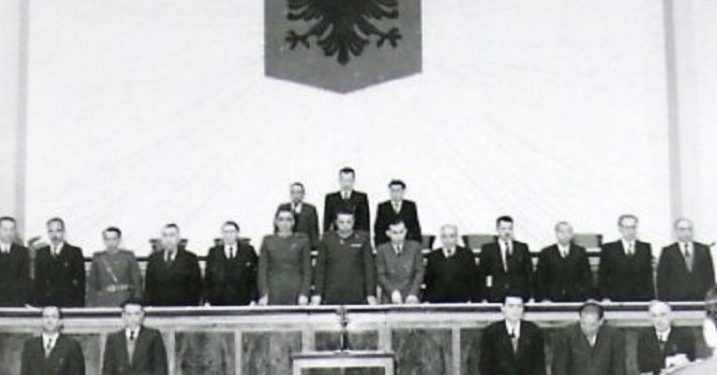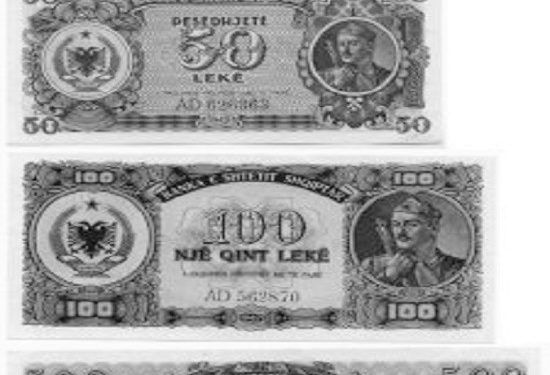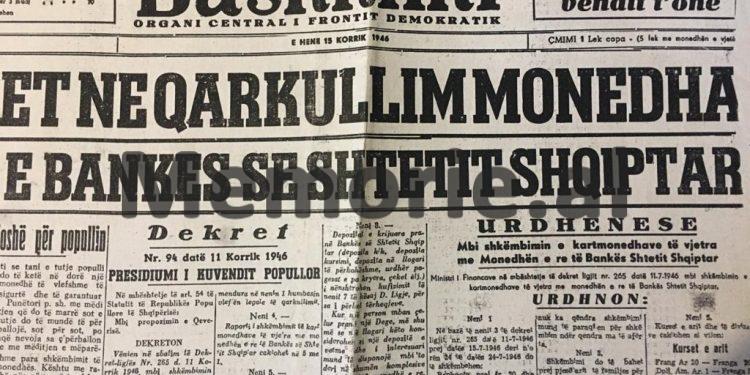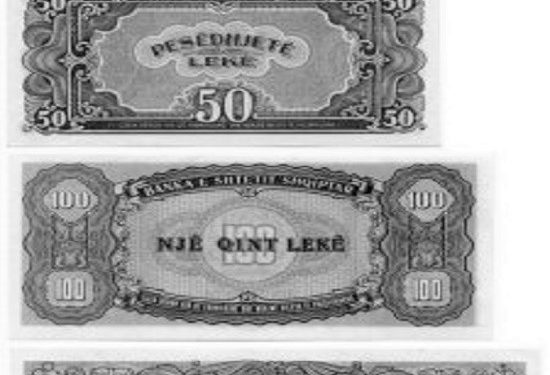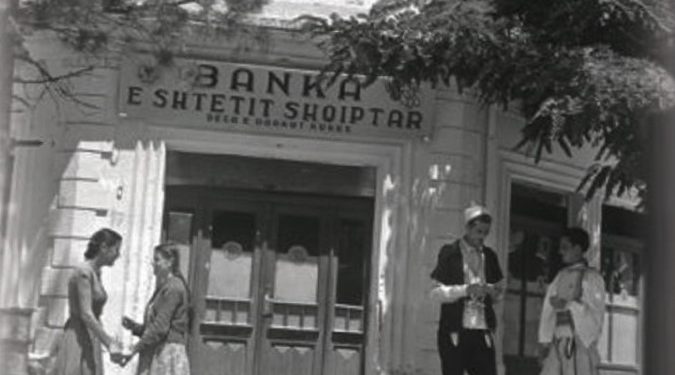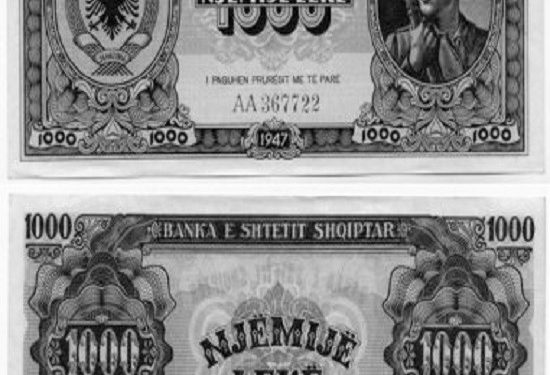Dashnor Kaloçi
Newspaper “Bashkimi”: Sound currency for the people
Another important measure for the good of our people was added to the great reforms and other measures that the People’s Power has taken so far. The removal from circulation of the old currency that we inherited from the fascist occupier and its replacement with the new currency of the State Bank of Albania is a step towards recovery, and the strengthening of our economy, is a very important step of for the good of the people who from now on will have their own currency, a safe, strong currency guaranteed by our People’s Power and based on the economic power and money of our country as well as the reserve of gold held by the State Bank. The new currency of the Albanian State Bank will be exchanged for a sum of 100 old francs, equal to 20 new francs. The small old coins of 20 francs and below will still remain in circulation, all with a value discounted five times. The exchange begins today and ends at midnight on July 14, 1946; from this date onwards, the old coins of 20 francs no longer go. Exchange according to the provisions of Decree-Law no. 265 and the current Ordinance of the Ministry of Finance, is made at the branches of the Bank of the Albanian State, or at the open exchange offices for such purpose in centers where there are no branches of the Bank.
Sugar crumbs are also needed for money exchange
Each head of household equipped with a sugar cane goes to the Bank branch or exchange office to receive the corresponding amount in the new currency. For the villagers in these times of great agricultural work, our government has planned to make it easier for them by disposing that in the name of the village, only one person can exchange the money, who will have together with the sugar crumbs also a long list of all the families that will exchange money. With the deduction of currency Our government has predicted that the price of all trade items, all current and arrears taxes, debts, rents, public and private services, salaries of employees and workers’ wages and every action will decrease in equal proportion other financial. This measure keeps the balance of our market and all financial relations intact. In a word, this operation does not bring any loss to anyone but the great benefit from the fact that from now on the people will have in their hands a valuable safe and guaranteed currency. Workshop, e.g. with the wages he will receive from now on, he will be able to afford, for today, as much need as he could afford with the previous wages before the exchange of currency. So on for the clerk, the peasant, the merchant, the craftsman of every other man. The ordinance of the Ministry of Finance stipulated that for every family there would be an immediate exchange of up to 5000 old banknotes; surpluses exceeding this amount are transferred to fruit deposit. For agriculture and reconstruction needs, these deposits will start to be returned after the exchange deadline expires. Exchange modalities will be determined in detail by special order of the Ministry of Finance. This shows that our Government is always thinking and acting for the good of the people with this measure that aims to continue the reconstruction of our country as fast as possible so that the people will be provided with a life as long as possible. happy and as blissful as possible. So, there will be more schools, hospitals, bridges, roads, and agriculture will be improved as much as possible for the benefit of our village.
Who hides the money, in the Military Court as a saboteur
Against those who will try to hide the money by giving it to others in exchange so that the excess amounts do not go to the benefit of the people for the reconstruction of the country as well as against those who will agree to exchange money for someone else, our People’s Power will take strict measures by referring to the Military Court as saboteurs of the Government. Also, against those who will try to disturb the market by refusing to sell commercial items, our Government envisages, even for them, to take strict measures by calling them saboteurs of the Government. For such an important measure for the recovery of our currency, for the strengthening of the economy and for the reconstruction of our country, all organizations and all the people must be mobilized in order for the exchange to take place as soon as possible and as fairly as possible. The issue here also arises for the villagers who, being far from the centers, should be informed as soon as possible about such a measure. In order for these not to be left unpaid before the deadline.
Decree of the Assembly on the implementation of the law on money exchange
Decree. Nr. 94. dated 11 July 1946. Presidium of the People’s Assembly. In support of art. 54. of the Statute of the People’s Republic of Albania; On the proposal of the Government. Decrees. Implementation of Decree-Law no. 265 d. 11 July 1946, on the exchange of banknotes and currency checks issued by the National Bank of Albania and issued by the Bank of the Albanian State as well as Czech coins issued by the Bank of the Albanian State, with the following title and content: Decree-law no. 265 dated 11 July 1946 on the exchange of banknotes and currency checks issued by the former National Bank of Albania and overcharged by the Bank of the Albanian State as well as Czech coins issued by the Bank of the Albanian State.
Article 1.
Withdraw from circulation; The 20- and 100-franc banknotes are issued by the former National Bank of Albania and replenished by the Albanian State Bank. Czech currency from fr. 20-100-200-500-1000-200 and 5000 issued by the former National Bank of Albania and charged by the State Bank of Albania. Czech currency of fr, 100-200 and 500 issued by the Bank of the Albanian State on the form of the former National Bank of Albania and on its form.
Article 2.
Banknotes and coins issued by the former National Bank of Albania from fr. 5-2-1-0,40-0,20-0,10, remain temporarily in circulation at the following values:
Wit. 5 for fr.1
Wit. 2 for fr. 0.40
Wit. 1 for fr. 0.20
Wit. 0.40 per fr. 0.10
Wit. 0.20 per fr. 0.05
Wit. 0.10 per fr, 0.01
While other divisional coins lose the legal value of the circulation.
Article 3.
The Bank of the Albanian State is authorized to replace the banknotes mentioned in Article 1, new banknotes with a premium of fr. 500, 100, 200, and 5. The deadline and date of commencement of the exchange for all of Albania shall be set by the Ministry of Finance. After this period the banknotes referred to in Article 1 lose their legal circulation value.
Article 4.
The exchange ratio of old banknotes with the new currency of the State Bank of Albania is set at 5 to 1.
Article 5.
For the effect of this Decree-laws are considered automatically reduced from the first day of exchange in a ratio of 5 to 1 all financial reports such as: prices of goods of any nature (industrial and agricultural), public and private services, rents, salaries, various debts and credits, financial income and expenses of any nature, taxes and any kind of erosion.
Article 6.
The exchanges will take place at the Branches of the State Bank of Albania and at the exchange offices that it has to decide for this purpose. This exchange, except in justified cases, is obligatory to take place in those exchange centers that are located closer to the usual residence of the buyers and will be carried out with modalities that will be determined by special order of the Ministry of Finance.
Article 7.
The exchange of old coins with those of the new issue should be carried out immediately when the total amount presented for exchange does not exceed 5000 fr. (equal to fr. 1000 value in new currency) for each family. When a person submits for exchange an amount of more than 5000 fr, the balance is prohibited with the State Bank of Albania against the issuance of a deposit receipt, in the name of the possessor. The surpluses spent in this amount are kept in fruitful deposits and will be used for reconstruction works. These deposits will be returned within a time period to be determined by order of the Ministry of Finance. For the needs of agriculture and reconstruction these deposits will start to be returned immediately after the expiration of the exchange term. The return modalities for each case will be determined in detail by the Ministry of Finance. Profit rates are not subject to State Entities, State Enterprises, Cooperatives, Trade Unions and Political Organizations.
Article 8.
Deposits created with the State Bank of Albania (k / k deposits, savings deposits, temporary account deposits, outstanding payment orders, checks, etc.) are subject to the restriction of article 7 of this Decree-Law, regarding withdrawals. When a person holds a check at a Branch, more than one account these are considered as a single deposit and the interested party can withdraw on them up to the complex amount of fr, 1000 new currency. Deposits opened with the various branches of the State Bank by a single person are also considered.
Article 9.
Holders of bank checks in francs issued by the former National Bank of Albania must be presented for exchange at the Branches of the State Bank of Albania within the time of the banknote exchange. At the end of this period the possessors lose the right to a refund. These are subject to the limitation of Article 7.
Article 10
The Ministry of Finance is in charge of determining with a special order the new courses that will be applied by the Bank of the Albanian State in relation to gold and foreign exchange.
Article 11
Whoever exchanges or attempts to carry out exchange actions on behalf of another, as well as whoever exchanges or attempts to exchange through another, to whom, in addition to the confiscation of the banknote, refers to the Military Court as a saboteur of power under law no. 21. dated 15.12.1944. Also considered as saboteurs of power and will be judged by the Military Courts all those who will violate the deposits of this Decree-laws as well as the ordinances that will be issued by the Ministry of Finance regarding the implementation of these provisions.
Article 12
This Decree-law enters into force immediately.
president
Omer Nishani d.v. Secretary Sami Bahiolli d.v.
Tirana on July 11, 1946
The communist regime also seized foreign currencies
In addition to seizing gold and money owned by Albanian merchants and the wealthy in the first years after the end of the war, the communist government of Enver Hoxha, “in the framework of reforms and measures taken to increase the welfare of the people,” took care to collect and all the foreign currency which at that time was mainly in the hands of hundreds of foreign nationals who had remained in Albania at that time, such as: Italians, Germans, Greeks, Macedonians, Serbs, Poles, Austrians, etc. (most of them were arrested and imprisoned ), as well as Albanian traders who over the years had traded with various European countries and beyond, such as: Greece, Italy, Yugoslavia, Germany, France, England, Turkey, USA, Argentina and as far away as Japan. . All the coins of these different countries that as we said above were in the hands of Albanian traders, the communist government of Enver Hoxha was able to collect them through a special law that was issued at that time. Through that tax law (mandatory), it significantly reduced the exchange rate of foreign currency during its exchange with the local Albanian currency. Likewise, the decree-law that obliged the Albanian citizens to exchange no more than 5000 old francs in exchange for the new currency issued by the then State Bank of Albania (other money on this amount was immediately seized), was also valid for foreign citizens who were in Albania at that time. In this regard, in the decree-law of the Presidium of the People’s Assembly dated 11 July 1946 (signed by the chairman Omer Nishani and the secretary Sami Baholli), as well as in the ordinance of the Ministry of Finance which was then headed by Minister Ramadan Çitaku, was a special article which said: “Private foreign nationals will be presented with a temporary residence permit”./ Memorie.al




